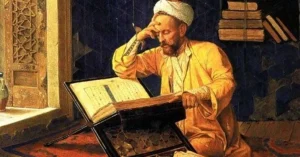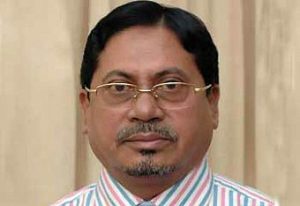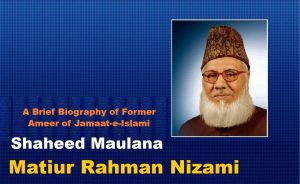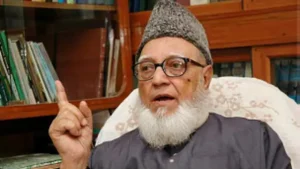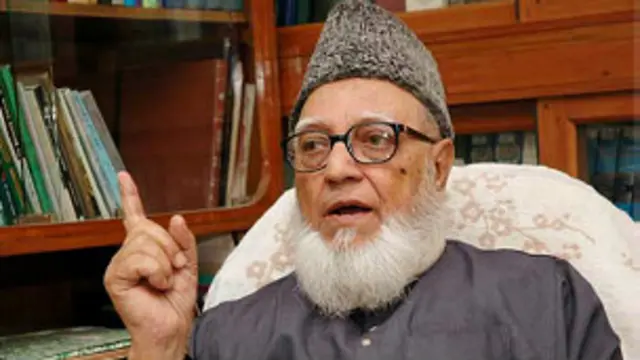
Professor Ghulam Azam
Professor Ghulam Azam (1922–2014) was a key figure in Bangladesh’s political history—a language movement activist, Islamic thinker, and former Ameer of Jamaat-e-Islami. His life exemplified Islamic values, political insight, and national dedication, continuing to inspire millions today.
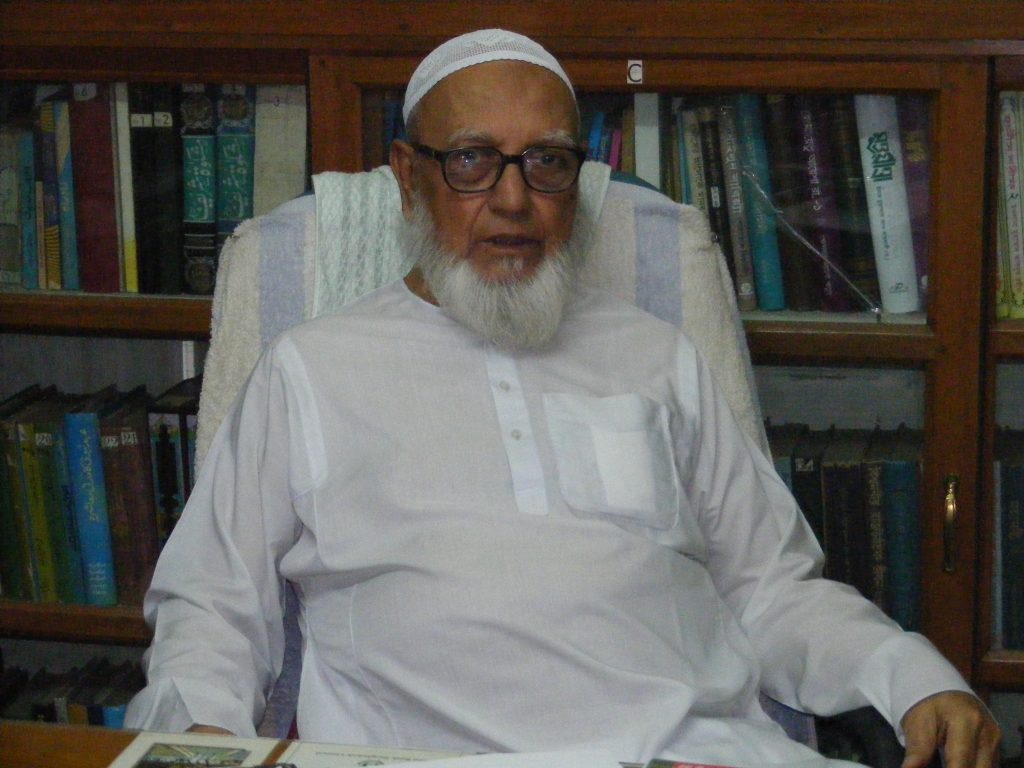
Birth and Family Background
Ghulam Azam was born on November 7, 1922, in the Shah Shaheb house (Miya Shaheb’s Maidan) in Laxmibazar, Dhaka, at his maternal grandfather’s home. His ancestral home lay in Birgaon village, located in the Nabinagar upazila of Brahmanbaria district. Coming from a respected family of scholars, his grandfather, Mawlana Abdul Sobhan, earned a reputation as a distinguished Islamic scholar. His father, Mawlana Ghulam Kabir, pursued his studies at Dhaka Mohsinia Madrasa and later became a teacher. In 1948, the family permanently relocated to Dhaka, marking a new chapter in their lives.
Education
Ghulam Azam was a brilliant student throughout his academic life. In 1937, he passed the junior madrasa exam with first division. He ranked 13th in the SSC exam in Dhaka and 10th in the IA exam. Due to his active involvement in the language movement, his MA exam was delayed, but he ultimately graduated with a high second division in 1950.
Teaching Career
On December 3, 1950, he began his teaching career as a lecturer in political science at Carmichael College, Rangpur, and taught there until 1955. He was so popular among students that even those from other departments attended his lectures.
Tabligh Jamaat and Tamaddun Majlish
After completing his education, Professor Ghulam Azam actively joined the Tabligh Jamaat, where he served as the Ameer of Rangpur district from 1952 to 1954. At the same time, he led the Rangpur branch of Tamaddun Majlish, a role that introduced him to the early stages of the language movement and ignited his passion for social awakening in East Pakistan.
Joining Jamaat-e-Islami
In 1954, he formally joined Jamaat-e-Islami, and just a year later, he became a full member (Rukon). Gradually, he moved up the ranks—first as Ameer of Rajshahi Division, then as Assistant Secretary of East Pakistan Jamaat, and ultimately, in 1969, he was elected Ameer of East Pakistan Jamaat-e-Islami. Later on, from 1991 to 2000, he led Bangladesh Jamaat-e-Islami as Ameer for three consecutive terms, before voluntarily stepping down in 2000.
Ghulam Azam in Language Movement
As General Secretary of DUCSU, Ghulam Azam played a bold and principled role in the language movement. Notably, in 1948, he submitted a memorandum to Prime Minister Liaquat Ali Khan, demanding that Bengali be recognized as a state language. Through his leadership, he galvanized students and helped build public awareness about the importance of linguistic rights.
Struggle for Democracy and Political Movements
Throughout his career, Ghulam Azam consistently opposed autocratic regimes. In particular, during 1964, he helped form a united opposition alliance against Ayub Khan’s rule. Moreover, he played a key role in establishing both the Pakistan Democratic Movement (PDM) and the Democratic Action Committee (DAC). He also represented East Pakistan Jamaat-e-Islami at the Round Table Conference, which further highlighted his political stature.
Architect of the Caretaker Government Concept
In 1980, he proposed the idea of a caretaker government, a concept that reshaped Bangladesh’s electoral system when it became law in 1996.
Writer and Thinker
Despite his political responsibilities, Ghulam Azam remained a prolific author, writing over 107 books covering Islam, politics, society, and movements. His works appeared in English, Urdu, Tamil, and Assamese, extending his influence across cultures. In 1958, he took charge of journalism by serving as editorial board president of the daily Ittehad.
Contributions on the International Stage
He participated in many international Islamic conferences and delivered keynote speeches at events hosted by the World Assembly of Muslim Youth (WAMY), ISNA, ICNA, UK Islamic Mission, and the Turkish Refah Party, among others.
Tireless Efforts for Islamic Unity
In 1978, he laid out a blueprint titled “Islamic Unity and Islamic Movement” to promote cooperation among Islamic forces. By 1981, he founded “Ittihadul Ummah” to institutionalize unity efforts. His 1998 booklet, “We Need an Islamic Unity Platform,” reflected two decades of dedicated work toward global Muslim unity.
Imprisonment and Political Persecution
Ghulam Azam’s political journey involved numerous arrests. Authorities detained him twice during the language movement, again in 1964, in 1992 after revoking his citizenship, and finally in 2012 under orders from the International Crimes Tribunal (ICT). After 21 years, the Supreme Court reinstated his citizenship in 1994.
Read the biography of Maulana Matiur Rahman Nizami >>>
Final days of Ghulam Azam
In his later years, he remained in custody despite serious health issues. On January 11, 2012, the ICT arrested him for his alleged role in the 1971 Liberation War. Many national and international human rights organizations criticized the trial as politically motivated and biased.
While in prison, Ghulam Azam suffered from multiple age-related illnesses. His family and legal team repeatedly requested bail or medical release, but the authorities consistently denied those appeals. As his condition worsened, he was moved to the prison cell of Dhaka Medical College Hospital for treatment.
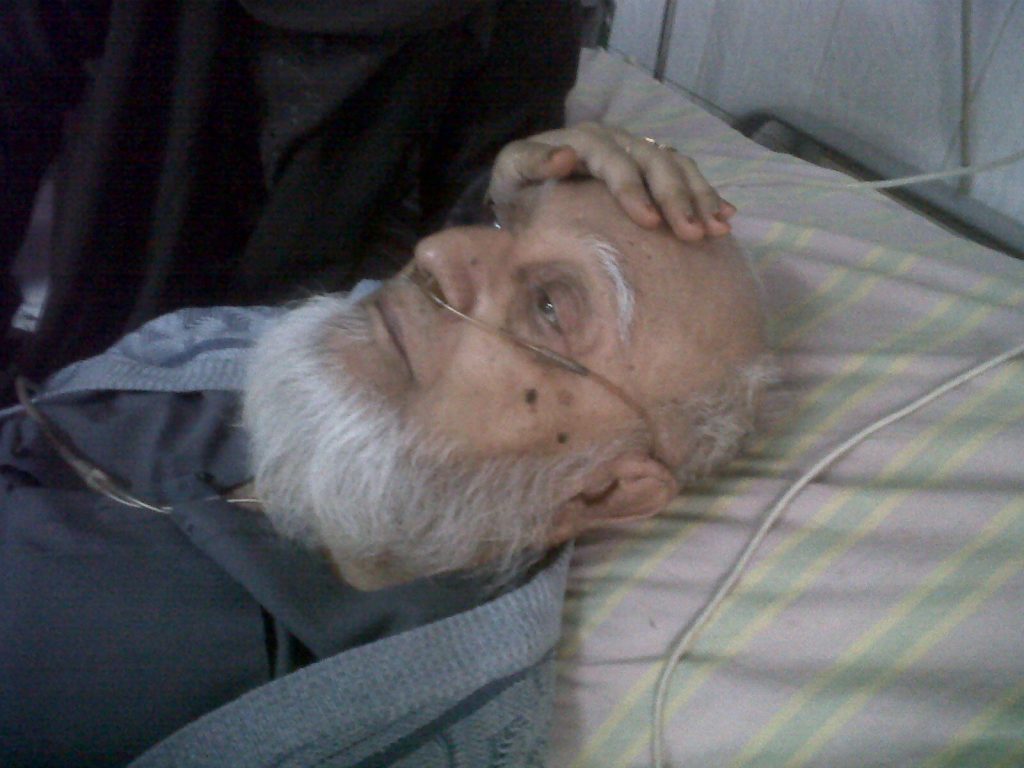
On October 23, 2014, at 10:10 PM, Professor Ghulam Azam passed away at Dhaka Medical College Hospital (Inna Lillahi wa Inna Ilayhi Raji’un). He was 91 years old and had remained on life support in a coma for several days before his death.
Funeral and Burial
Thousands of mourners gathered at the first Janazah (funeral prayer) at Baitul Mukarram National Mosque in Dhaka. The second Janazah took place in his ancestral village Birgaon, Nabinagar, Brahmanbaria, where he was buried in the family graveyard.
Reactions Following His Death
Following his death, Islamic scholars, political leaders, organizations, and ordinary people from Bangladesh and abroad expressed deep grief. Many described him as a “martyr” and a principled, selfless leader. Several international organizations raised serious concerns about the fairness of his trial and extended their condolences to his family.
Conclusion
The passing of Professor Ghulam Azam marked the end of an era. His life was a reflection of truth, ideals, and struggle. Even in imprisonment, his patience, trust in God (Tawakkul), and unwavering faith stood as a shining example in the history of Islamic movements.

